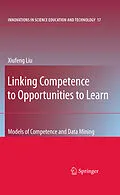The current world-wide movement toward standards-based science education is based on a belief that every student, no matter how different he/she is, can and should reach a prescribed level of competence. Yet there are differences in circumstances between students that lie beyond their control, such as classroom, school and family resources and practices. Thus it is more important than ever to identify the particular resources and practices that significantly predict students' levels of achievement so that strategies can be developed to help students reach competence.
This book applies data mining methodology to the issue of standardizing achievement in science education and develops frameworks of competence in the 'Opportunity-to-learn' (OTL) model of science education. It is aimed primarily at science education researchers, but can also be used as a reference by national and state education agencies who are required to make decisions about science curriculum standards and resource allocation. School district personnel will also find it useful in teacher professional development.
Opportunity-to-learn (OTL) refers to the entitlement of every student to receive the necessary classroom, school and family resources and practices to reach the expected competence. This book quantifies and stystematizes OTL by developing models showing how the circumstances of classroom, school and family relate to students' achievement. Liu has also applied data mining techniques to these models. In addition, the text analyzes policy as well as pedagogical implications for standards-based science education reform.
Zusammenfassung
For many people, a high standard for student learning is desirable. This is what underlies current standard-based science education reforms around the world. As someone who was born and brought up in a less-privileged home and educated in a resource-limited school environment in a developing country, I always had to study hard to meet various standards from elementary to high school to univ- sity. My first book in English published over 10 years ago (Liu, X. [1996]. Mathematics and Science Curriculum Change in the People's Republic of China. Lewiston, NY: The Edwin Mellen Press) provided me an opportunity to examine standards (i. e. , Chinese national science teaching syllabi) from a historical and political point of view. I argued that standards are developed for particular poli- cal agendas in order to maintain the privileged position of certain groups (i. e. , urban residents) in a society at expenses of others (i. e. , rural residents). Thus, underneath standards is systematic discrimination and injustice. Since then, I have had opportunities to study the issue of standards in much more breadth and depth. This book, Linking Competence to Opportunities to Learn: Models of Competence and data mining, provides me an opportunity to examine standards from a different perspective: opportunity to learn.
Inhalt
Equity and Excellence in Standard-Based Education.- Competence and Opportunity to Learn.- Models of Competence and Data Mining.- Models of Competence and Opportunities to Learn in the Classroom.- Models of Competence and Opportunities to Learn at Home.- Models of Competence and Opportunities to Learn in Schools.- Pedagogical and Policy Implications.
